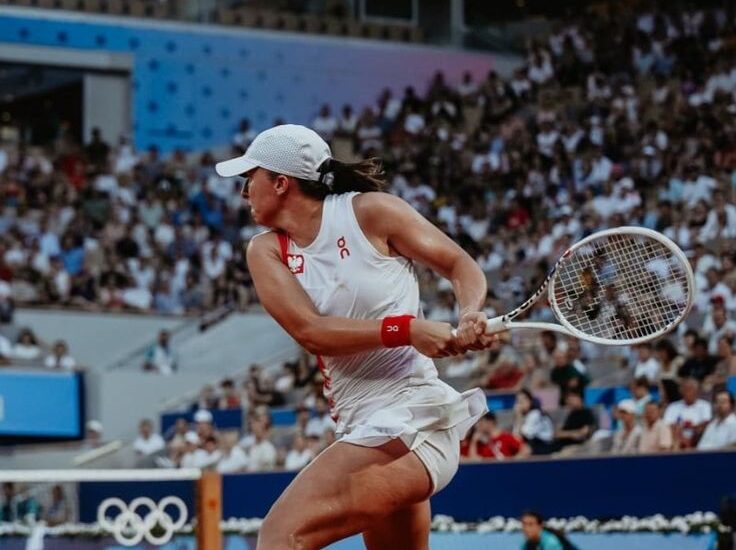
Just New:Iga Swiatek trains with NEW COACH ahead of WTA Finals…
Just New:Iga Swiatek trains with NEW COACH ahead of WTA Finals…
As the tennis season approaches its climactic finale with the WTA Finals, Iga Swiatek has made headlines not just for her formidable skills on the court, but also for a significant shift in her training regimen. The Polish star has recently begun working with a new coach, a move that promises to add a fresh dynamic to her already impressive game. This article delves into what this change means for Swiatek, the implications for her performance at the WTA Finals, and the broader context of coaching in professional tennis.
The Importance of Coaching in Tennis
Coaching in tennis is a multifaceted role that goes beyond merely instructing players on technique. Coaches are crucial in developing strategies, managing player psychology, and adapting training regimens to maximize performance. They serve as mentors, providing guidance through both victories and defeats. For a player like Swiatek, whose career has rapidly ascended since she burst onto the scene by winning the French Open in 2020, a new coach can bring new perspectives and insights that could prove invaluable.
Who is Iga Swiatek’s New Coach?
While specific details about Swiatek’s new coach are still emerging, it’s clear that this change has been carefully considered. The coaching landscape in tennis is rife with high-profile partnerships, each bringing a unique flavor to a player’s approach. Swiatek’s previous coach played a significant role in her development, so the decision to switch suggests a desire for a new strategy or a fresh take on her game. This change could be aimed at fine-tuning her skills for high-stakes matches, especially as she heads into a competitive field at the WTA Finals.
Training Regimen and Focus Areas
In the lead-up to the WTA Finals, Swiatek’s training has likely intensified, focusing on specific areas that could enhance her performance. Key areas of focus may include:
Mental Toughness: Competing at the highest level requires not only physical endurance but also mental fortitude. A new coach can introduce novel techniques for mental conditioning, helping Swiatek cope with the pressures of the Finals.
Tactical Adjustments: Each tournament presents unique challenges based on opponents’ styles. A new coach can provide fresh tactical insights, enabling Swiatek to adjust her play to counteract the strengths of her competitors.
Physical Conditioning: With the season winding down, maintaining peak physical condition is crucial. New training methodologies might be implemented to ensure Swiatek remains in top shape.
Shot Selection and Variety: Enhancing her shot selection could be key in tight matches. Working on adding variety to her game could help her break down opponents’ defenses.
Swiatek’s Journey: Building on Success
Iga Swiatek’s rise to prominence has been nothing short of remarkable. Her powerful baseline play, exceptional shot-making, and competitive spirit have garnered her numerous titles and accolades. However, with success comes scrutiny and pressure. Each tournament becomes a new benchmark, and the WTA Finals is a pinnacle event that tests even the best.
Historically, many top players have made coaching changes during pivotal moments in their careers. For instance, the transitions made by athletes like Serena Williams and Rafael Nadal at various points have often yielded positive results. Swiatek’s decision to engage a new coach reflects her understanding that adapting and evolving is crucial to sustaining success.
Expectations for the WTA Finals
As Swiatek heads into the WTA Finals, expectations are high. The tournament, which gathers the best players from the season, is a significant stage where performances can define legacies. With her new coaching strategy in place, observers will be keen to see how Swiatek adapts her game in real-time against the elite competition.
Key aspects to watch during the Finals will include:
Match Strategy: How effectively Swiatek implements her new coach’s strategies in high-pressure situations.
Adaptability: The ability to adjust her game plan mid-match based on her opponent’s tactics will be crucial.
Emotional Resilience: Handling the ups and downs of tournament play, especially in tightly contested matches, will showcase the mental training she has undergone.
The Broader Implications of Coaching Changes
Swiatek’s shift in coaching is part of a broader trend in professional tennis where players frequently reassess their coaching arrangements to find the right fit. The tennis world is filled with stories of partnerships that have transformed careers, and the right coach can make all the difference in harnessing a player’s full potential.
Additionally, the relationship between player and coach is highly personal. Trust and communication are vital components, and a successful partnership can lead to mutual growth. Swiatek’s new chapter in coaching underscores the evolving nature of sports careers.
You may also like
Archives
Categories
- ABA
- Actor
- Actress
- Actress and singer
- Band
- Baseball
- Basketball
- Boxer
- Broadcasting corporation
- CCR
- cricketer
- Cyclists
- Dart
- Drummer
- Fictional character
- Football game
- Formula 1
- Golf
- Guitarist and songwriter
- Guitarists
- Gymnastics
- Hockey
- Ice hockey
- Marathon
- MLB
- Motocross
- MotoGP
- Motorcross
- Musician
- Musician and drummer
- NFL
- NHL
- NRL
- Racer
- Red bull Racing
- Rider
- Rock band
- Rugby league
- Simone Biles
- Singer and songwriter
- Songwriter and musician
- Sport commentator
- Tennis
- Texas longhorns
- Track and field athlete
- Uncategorized
Leave a Reply